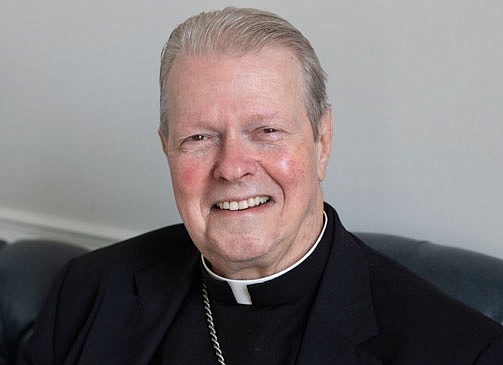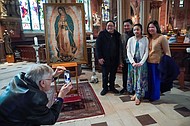April 20, 2023 at 7:00 a.m.
The Thomas in all of us
Have you ever questioned? Have you ever doubted? Reading all the Gospel accounts of the events following the death of Jesus Christ, it is almost impossible to come to any other conclusion than that the first reaction of even his closest disciples was disbelief. Why should that surprise us, people who are used to being lied to every day, and by those in the highest levels of our social order? No need to name names or parties or professions.
One name, curiously, has never been forgotten for almost two thousand years: Thomas. Or should I say doubting Thomas. Imagine if the one stupidest thing you ever did was the epitaph next to your name at your gravesite: boozy Joe, the guy who fell at his daughter’s wedding reception. Or, clueless Kathy, the lady whose cell phone siren went off in church — loudly. So, Thomas dared to ask questions about what he was hearing, and we forget all that he did in life, except his doubt. Except it is possible that had he not asked, we would have known the answer which, as it turns out, might have deprived us of having a real representative on the scene.
In many ways, it seems to me, Thomas is very much one of us or our contemporaries. He takes the scientific approach — the real scientific approach, not politicized or filtered through some ideological prejudices. He wants just the facts. He is not questioning the experiences of the other ten — Judas, in despair, had previously disposed of — who were huddled in that room, most probably on the day Christ rose, for fear that they would be coming after them just as for Jesus. Why Thomas was not there when Jesus first appeared to the ten, we do not know. Maybe he didn’t tell them. Maybe he just wanted to be alone, like Peter and the rest of them, except for John, on the day of the crucifixion. Maybe he needed time to sort things out himself. Alone. He seems to have kept in touch, at least, and we have the account of his questioning later in the week the experience they all claim to have had Sunday, of seeing the risen Lord.
Haven’t there been times when we have all doubted, or been prone to question, the experiences of people who claim to have been touched by God, to have felt the presence of an angel, or even been healed of some ailment or trauma, psychological or spiritual. I have a friend who often says, “I don’t pray for miracles, I depend on them.” In my lifetime, I have encountered many people who confess that their lives have been changed radically by turning to the Lord. I can say with the certainty of faith — and experience — that Jesus changes lives. And always for the better, without exception. Many may take this as fine for me — my truth, as if it is okay for me to have my opinions, but a life of consistent witness to the action of Jesus and the Holy Spirit in human lives — my own, as well — is somehow on a subjective, “non-scientific” plane.
Well, here is Thomas, acting very much like any person in our own time, perhaps ourselves, just wondering whether what the disciples were telling him was some kind of “spiritual” or emotional sense of “presence,” something they did not actually see, like a leaf in the window, or something you thought you saw. A flash of light that seemed like a sign from heaven, a rainbow after a particularly violent thunderstorm, a beautiful landscape, God in nature, etc.
I remember the oddly humorous scene from Zeffirelli’s “Jesus of Nazareth,” when Anne Bancroft, portraying Mary Magdalene, shows up at the place where the men were hiding, proclaiming ecstatically, “I have SEEN the Lord!” They stare at her with the look that typically comes over one who is in the presence of a deranged person, and then begin to challenge her credentials. In so many words, they ask her to justify why he would appear to HER (and not them?). Her defense is as understandable as it is representative of the woman she so much is: “well I was there (unlike you!), why wouldn’t he!” As she storms out, slamming the door, it fails to catch, adding to the impression that her testimony is ineffectual, even ludicrous.
So, Thomas shows up the following Sunday and we know how the narrative goes. Jesus becomes present, though the doors are locked, and invites Thomas to literally put his finger in his wounds, his hand into his side. Thomas collapses at his feet: “My Lord and my God!” The devastating lines of Jesus — “blessed are those who have not seen but believe” — may seem to put the final brand on Thomas, the doubter, and maybe on anyone else who does not accept the testimony of believers. At the same time, Jesus did not deny Thomas the answer to his doubts. He showed him the mercy of appearing before him to be probed and tested, not at all disparaging the scientific method that continues to probe and test.
There is no such thing as “settled” science. Scientists must always ask questions, even questioning their own experiments and theories. They cannot become “believers” in their own certainties, let alone those of others. Thomas may have only been following the logic of his very reasonable thinking: people do not come back from the dead. Period. This is not how the world works. It is possible, is it not, that we of our scientifically and technologically sophisticated era, assume people of Thomas’ time were naïve and gullible? Here is clear evidence at least one was not. Thank God and thank St. Thomas for reminding us of that. Every age questions.
Thomas, no doubt, was wondering, just as you or I might, were his pals reporting some mystical, miraculous, or some nebulous state like a “near death” experience, or “having seen the light,” or being “cured” of some disease after prayer. Were the reporters just describing some intellectual or emotional conviction, not a real event? In short, was the “Jesus” the ten thought they saw just an idea, a feeling or a perception? Was this “risen” Jesus really the “dead” Jesus? Were they one and the same? Thomas doubted. Thomas got his answer. So did we.
Thank God for Thomas’ question. Thank God for the scientific method. Thank God for the testimony of faith. All of them are part of the human experience of seeking, finding and celebrating the discovery of truth. When it comes to the reality of Christ’s death and resurrection, all roads converge at the same starting point: Jesus Christ, dead and risen, is real and as alive today as in that upper room. He will not refuse one who is so happy to go to him, as Thomas did, and acknowledge him as “my Lord and my God.”
One further thought on Thomas. He was, arguably, the most traveled of the Apostles, having made it to India and, there is strong evidence, even to Myanmar, Cambodia and, possibly Malaysia — places far apart and with diverse cultures from the Greco-Roman world. His probing, scientific nature, may well have served his missionary zeal and effectiveness well, able as he was to understand the different ways seekers may come to find the truth. Who can deny that in our contemporary world, we need more Thomases, able to witness to God’s patience with us as we ask questions, learning from trial and error, but often enough with the certainty of faith.
@AlbBishopEd






Comments:
You must login to comment.